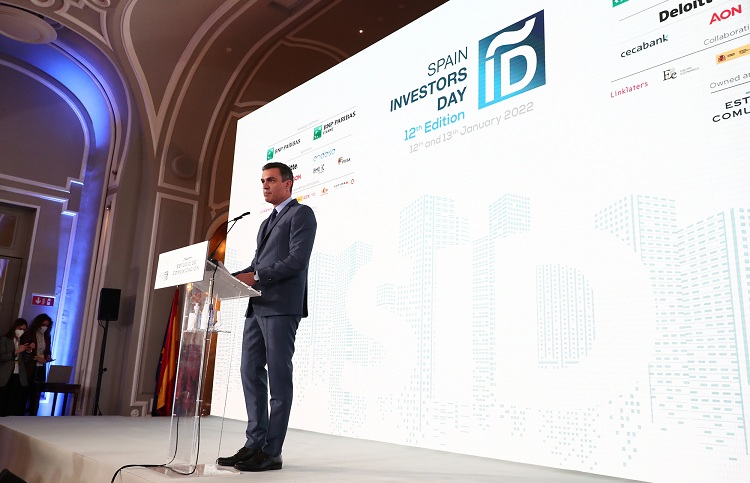The Diplomat
The President of the Government, Pedro Sánchez, assured yesterday at the Spain Investors Day that the Executive will request before June 2023 the 70 billion euros corresponding to the loans of the European recovery plan and will make more than 17 billion available to the productive fabric in the first half of this year.
“European funds are the basis of the new great economic modernization of Spain,” said the president at the closing of the Spain Investors Day, which was held on January 12 and 13 in Madrid and brought together managers and representatives of companies and multinationals.
According to Sánchez, Spain was one of the first countries to present its recovery plan to the European Commission, the first, together with Portugal, to obtain its approval and the first to present an application and receive a disbursement. To date, he specified, Spain has received a total of 19 billion euros. “The Next Generation Fund has been the greatest advance in this century for European integration,” he added.
The head of the Executive also highlighted that the 140 billion euros of European funds that Spain will receive until 2026 to invest in the modernization of the productive fabric represent an amount similar to the cohesion funds received over 34 years. He also recalled that Spain will receive 70 billion euros in transfers until 2026, to which the Executive will add, approximately, another 70 billion euros in loans to be requested before June 2023.
Regarding the execution of European funds, Mr. Sánchez specified that 91% of the more than 24 billion euros budgeted in 2021 for the Recovery Plan have already been authorized and announced that, for the first half of this year, more than 150 calls for proposals are expected to be opened, which will make available to the productive fabric an amount of more than 17 billion euros.
In addition, Pedro Sánchez highlighted the labor reform agreed with the social agents and said he was “convinced that the political actors will show the same sense of State that the social agents have shown when agreeing this important labor reform”, he said. The reform, he said, addresses imbalances such as temporary employment and precariousness, encourages indefinite-term contracts, promotes internal flexibility mechanisms in the face of dismissal, regulates subcontracting and places collective bargaining at the heart of the new model of labor relations, as is the case in the main European countries.
Sánchez also affirmed that the COVID-19 vaccination process has been a “collective success and the “best decision” of economic and health policy. “Our project for Spain is for Spain to grow. That its economy grows, that its employment grows,” he continued. “Never before has it been so worthwhile to invest in Spain,” he concluded.
The second and final day of the event began at noon with a luncheon colloquium chaired by the First Vice President and Minister of Economic Affairs and Digital Transformation, Nadia Calviño, who took advantage of her speech to ask economists to “trust” in Spain.
“We will be one of the leading countries in digital transformation and in reducing inequalities,” assured Calviño, who expressed her conviction that Spain will meet the growth targets set for 2022 despite the ups and downs and “uncertainties” of the current moment. “The European funds and the recovery plan will allow us to emerge from the crisis in a different way”, added the Vice-president.







